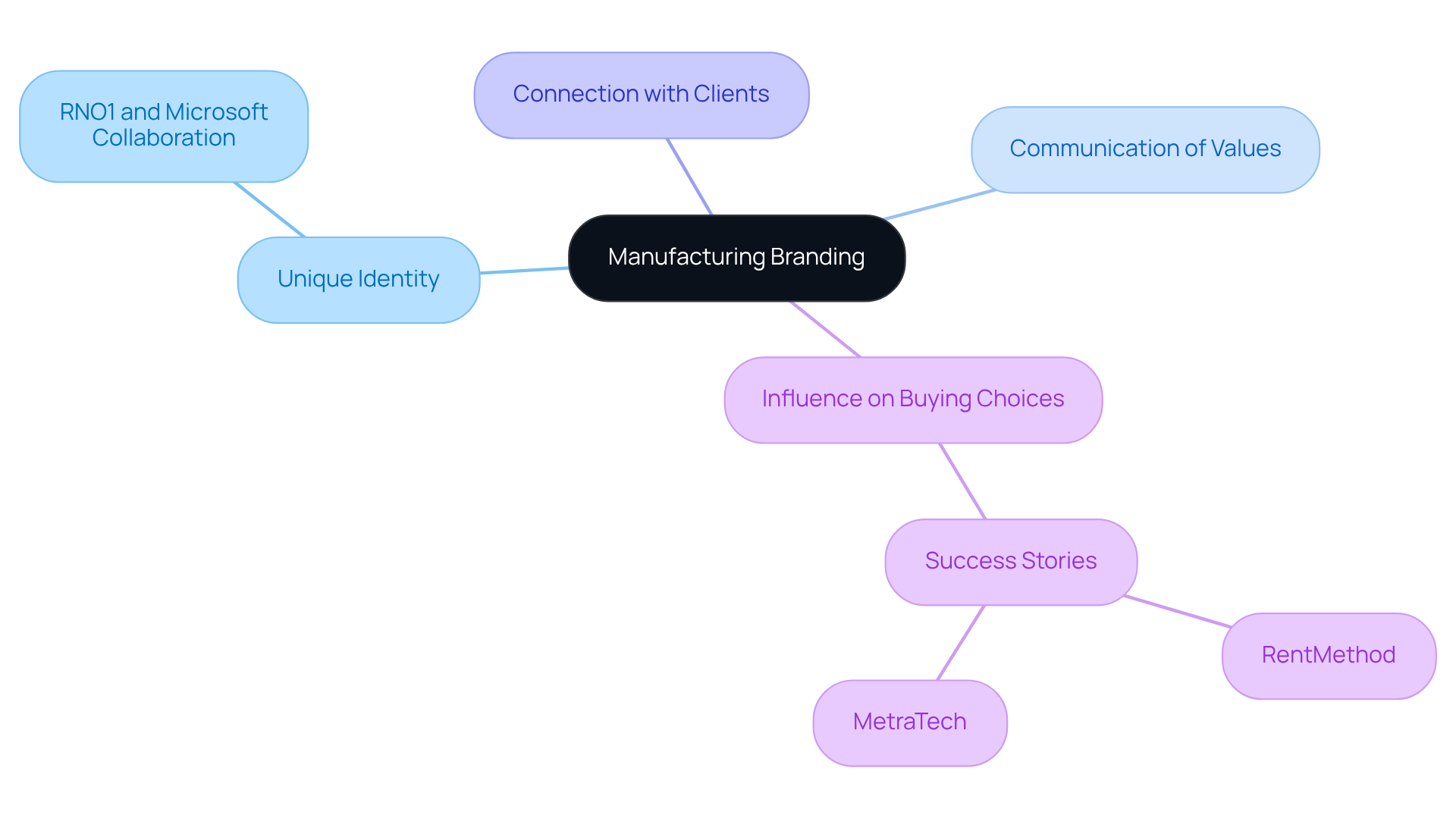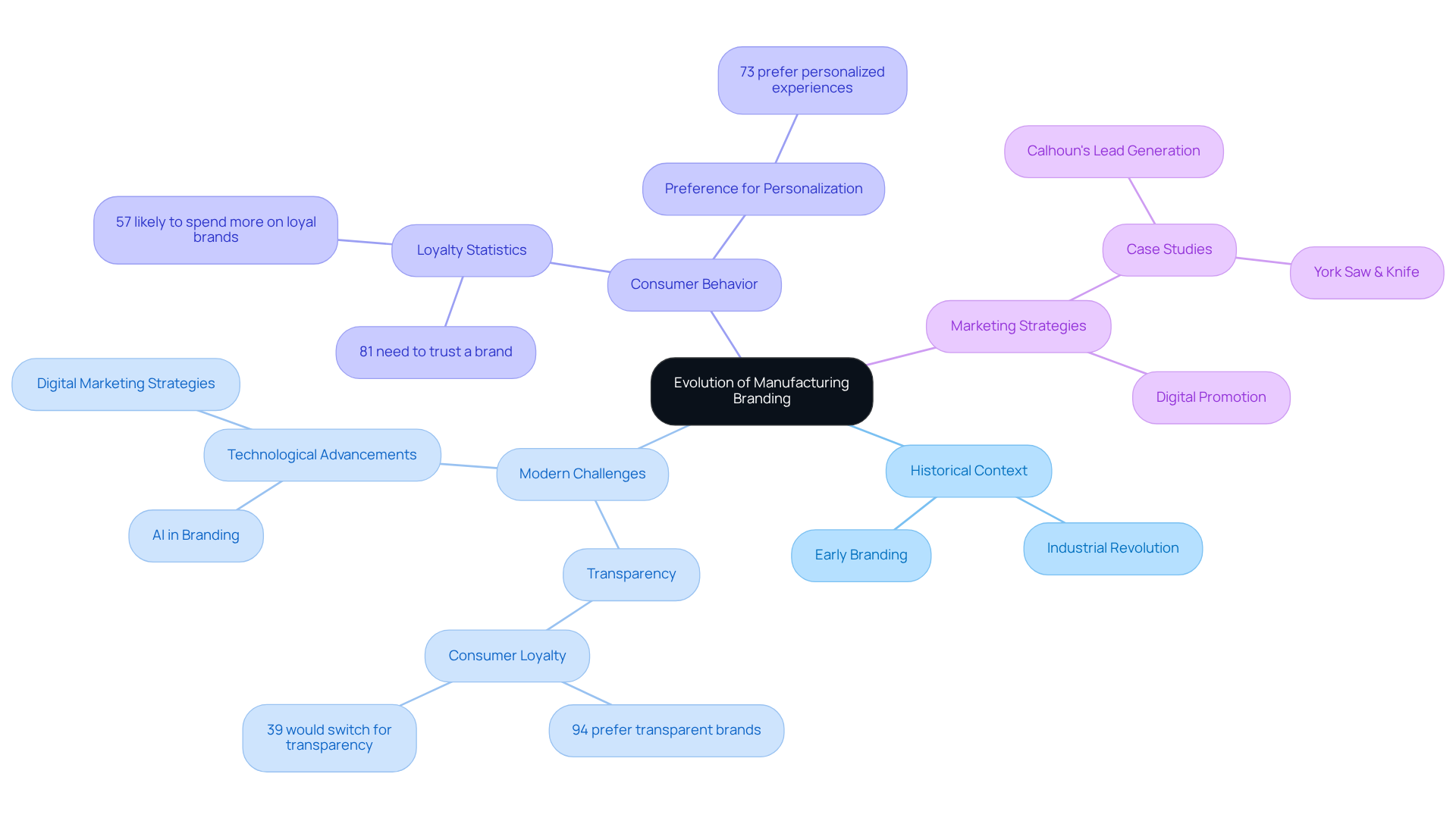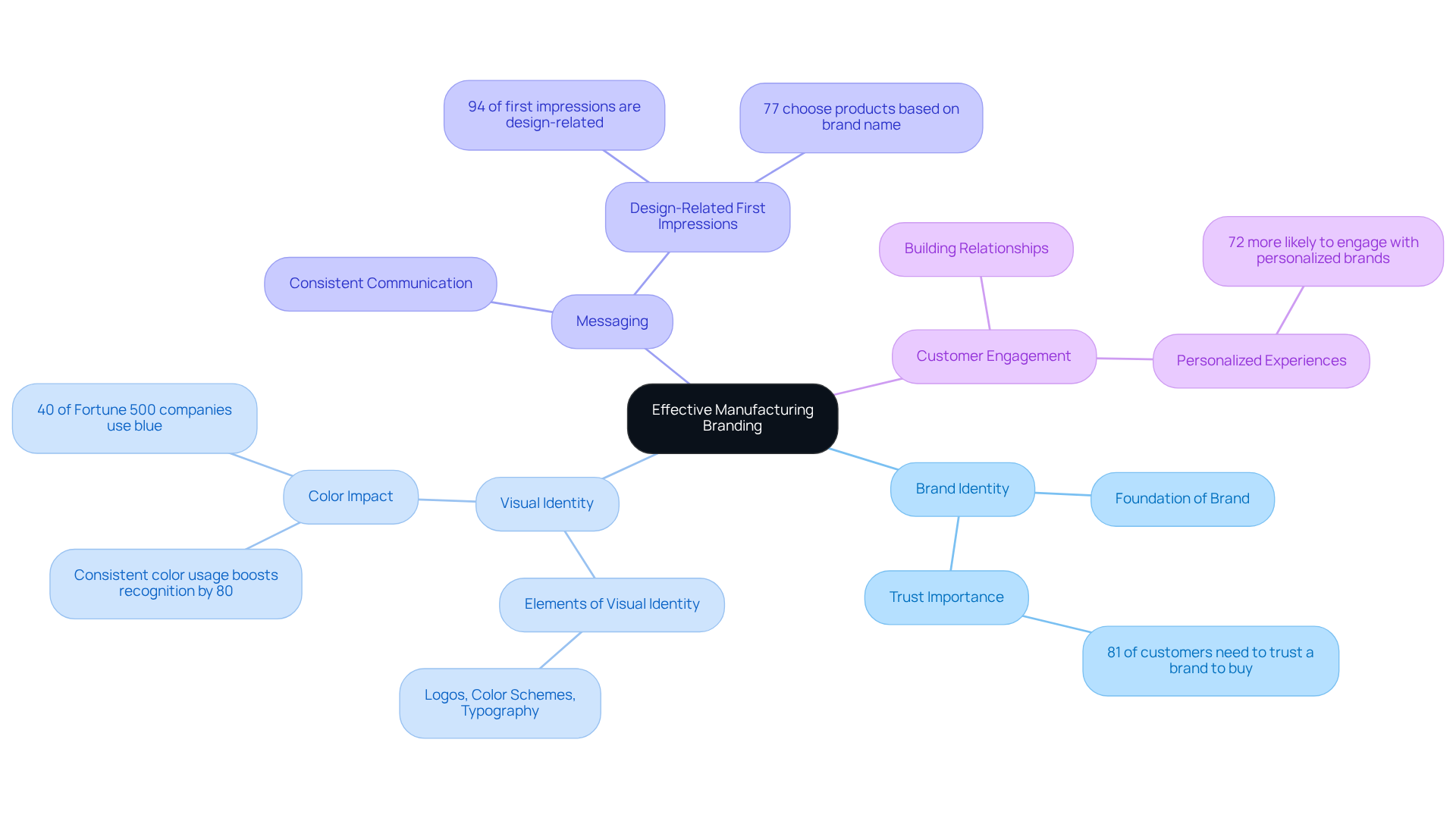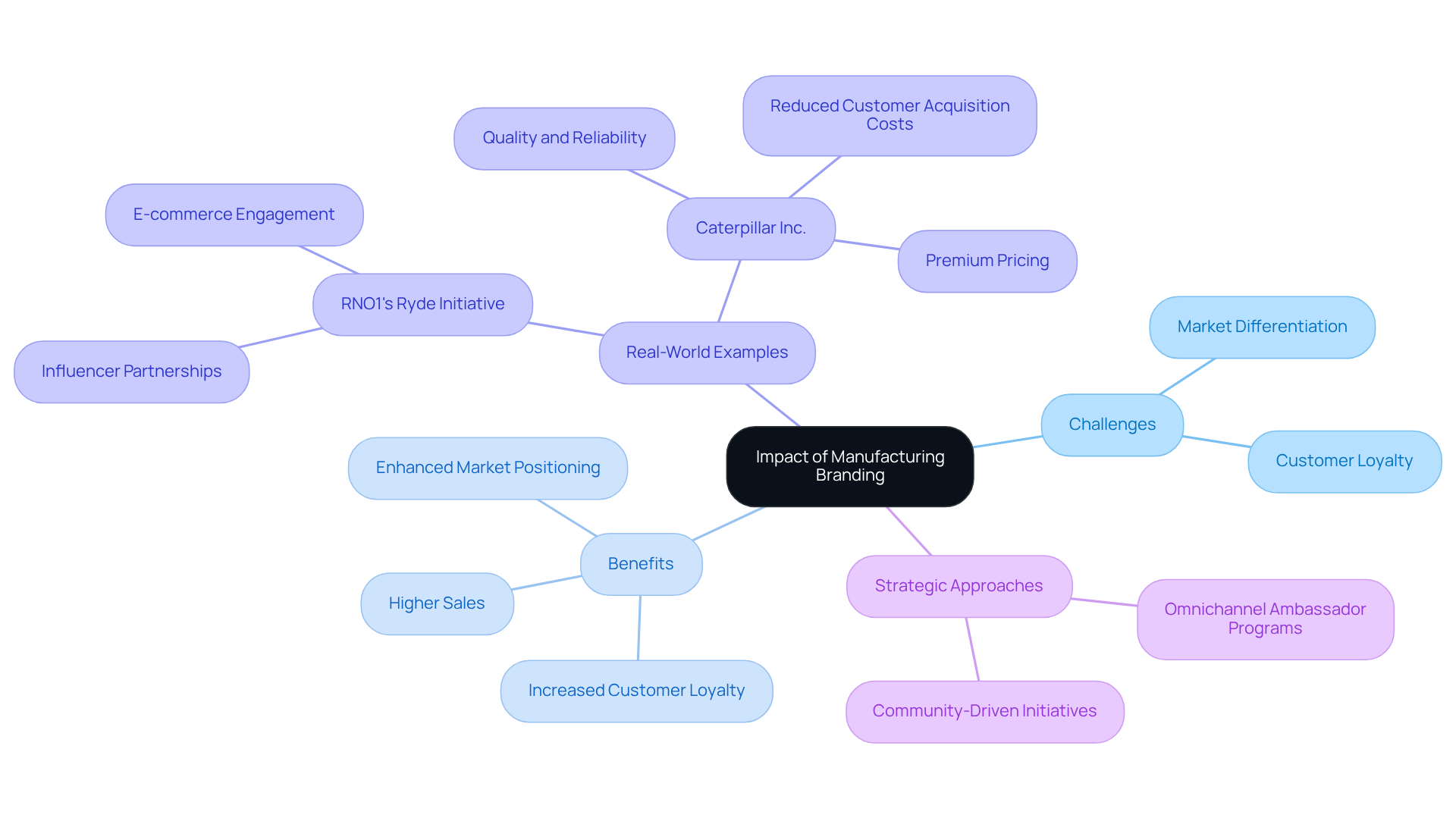Overview
In today's competitive landscape, many production companies struggle to carve out a unique identity that resonates with consumers. This challenge can lead to a lack of trust and loyalty, leaving manufacturers feeling lost amidst a sea of competitors. However, effective branding strategies can provide a nurturing solution. By focusing on:
- Clear brand identity
- Consistent messaging
- Meaningful customer engagement
manufacturers can differentiate themselves and foster lasting relationships with their audience. For instance, Caterpillar Inc. and RNO1 have successfully implemented initiatives that illustrate the power of strong branding. These examples remind us that with the right approach, it is possible to build trust and loyalty, ultimately driving business success.
Let's explore how embracing these strategies can transform not just your brand, but also your connection with customers, creating a supportive community around your business.
Introduction
Creating a distinct identity within the manufacturing sector can feel overwhelming, especially as the landscape grows more competitive and consumer expectations shift. Many manufacturers find themselves struggling to connect with their clients on a deeper level, fostering trust and loyalty that goes beyond mere logos and color schemes. This challenge can lead to frustration and uncertainty in a crowded marketplace.
So, how can manufacturers build a compelling brand identity that truly resonates with modern consumers and drives business success? By focusing on authentic connections and understanding the emotional needs of their audience, manufacturers can navigate these complexities and emerge with a brand that not only stands out but also builds lasting relationships.
Defining Manufacturing Branding: Key Concepts and Significance
Creating a unique identity for a production company and its products through manufacturing branding can feel overwhelming. Many founders struggle with how to effectively communicate their values and quality. This identity is not just about visual elements like logos and color schemes; it’s about manufacturing branding that establishes a connection with clients, fostering trust. Without a , it can be challenging to stand out in a crowded market, which can lead to feelings of uncertainty and frustration.
For instance, consider RNO1's collaboration with Microsoft. This partnership illustrates how creative marketing strategies can significantly enhance the visibility of manufacturing branding. In today’s world, where consumers are increasingly selective, effective manufacturing branding can profoundly influence buying choices and foster lasting loyalty.
RNO1's success stories, such as those of RentMethod and MetraTech, serve as a testament to the impact of a well-crafted identity. By focusing on these aspects, RNO1 offers a supportive solution that empowers tech startup founders to navigate the complexities of brand identity with confidence.

The Evolution of Manufacturing Branding: Historical Context and Modern Relevance
Manufacturing branding has undergone a profound transformation since its origins during the Industrial Revolution. Initially, product labeling served merely as a means to identify items and assure quality. However, as the industry evolved, manufacturing branding emerged as a vital tool that shapes consumer perceptions and fosters market differentiation. The Industrial Revolution marked a pivotal shift, as manufacturers began to realize the significance of manufacturing branding in building trust and loyalty among consumers.
In today’s digital landscape, manufacturers face the challenge of harmonizing their manufacturing branding with consumer experience, sustainability, and technological advancements. It’s noteworthy that 94% of consumers are more likely to remain loyal to a transparent company, underscoring the critical need for authenticity in marketing strategies. Moreover, brands that prioritize transparency can nurture deeper customer loyalty, with 39% of consumers willing to switch to a brand that is more forthcoming about its products. Additionally, 57% of industrial purchasers make buying decisions before directly engaging with a production firm, highlighting the essential role of brand identity in influencing buyer choices.
Contemporary examples of effective marketing strategies in manufacturing branding illustrate how companies leverage digital promotion and personalized experiences. For instance, brands that incorporate personalization into their marketing approaches can significantly enhance customer engagement and satisfaction, as 73% of consumers prefer brands that customize their shopping experiences. This shift towards manufacturing branding reflects the evolving expectations of today’s market.
The impact of the Industrial Revolution on product identity is evident in how manufacturers now approach their promotional efforts. With over 700,000 production companies in the U.S. alone, competition is fierce, and can be a crucial differentiator. Companies that maintain consistent messaging across various platforms are more likely to thrive, as brand consistency can boost revenues by up to 33%. A case study on Calhoun's lead generation through SEM illustrates how tailored digital marketing strategies can enhance promotional efforts within the production industry.
Ultimately, the evolution of manufacturing branding emphasizes the importance for producers to adopt innovative approaches that resonate with modern consumers, ensuring they remain competitive in a constantly changing market. The U.S. production sector is projected to contribute $2.1 trillion in value by 2025, further underscoring the significance of effective marketing in an expanding landscape.

Core Elements of Effective Manufacturing Branding: Building a Strong Identity
Establishing a strong market presence can feel overwhelming for many manufacturers. The challenge lies in navigating the complexities of branding while trying to stand out in a crowded marketplace. This is where RNO1 can assist you by guiding you through several core elements essential for effective manufacturing branding.
- Brand Identity serves as the foundation of your brand, encompassing your mission, values, and unique selling propositions. A clearly articulated identity not only sets you apart from competitors but also builds trust with your consumers. At RNO1, we are dedicated to design-driven solutions, ensuring that every aspect of your identity is thoughtfully crafted to enhance its impact. Research shows that 81% of customers need to trust a company before making a purchase, underscoring the importance of integrity in your branding efforts.
- Next, consider your Visual Identity. Elements like logos, color schemes, and typography are crucial for creating a memorable image. We believe that a design-focused approach can significantly elevate your visual identity, making it a top-of-mind solution for marketability. Studies suggest that consistent color usage can boost recognition by up to 80%. Notably, 40% of Fortune 500 companies opt for the color blue in their logos, illustrating a successful example of visual identity in action.
- Messaging is another vital component. Consistent communication that reflects your values and resonates with your target audience is essential. Our design-centric philosophy ensures that your messaging is coherent and visually appealing. In fact, 94% of first impressions are design-related, and 77% of consumers often choose products based on the company name rather than the product itself. This highlights the importance of maintaining consistent messaging.
- Lastly, Customer Engagement is key to fostering loyalty. Building relationships through personalized experiences and feedback mechanisms can significantly enhance your connection with clients. At RNO1, we emphasize design in our client engagement strategies, crafting individualized experiences that truly resonate. A remarkable 72% of consumers are more likely to engage with companies that provide personalized experiences, emphasizing the need for manufacturers to prioritize user interaction.
By focusing on these elements, you can cultivate an engaging identity through manufacturing branding that not only stands out but also nurtures loyalty and paves the way for long-term success. Together, let’s and connects deeply with your audience.

The Impact of Manufacturing Branding: Benefits and Real-World Examples
The challenges of establishing a strong manufacturing branding identity can feel overwhelming. Many companies struggle to cultivate customer loyalty and achieve market differentiation. This is where the power of branding comes into play, offering a nurturing solution that can significantly drive business success. Companies with compelling identities often enjoy increased customer loyalty, higher sales, and enhanced market positioning.
Take, for instance, RNO1's Ryde initiative, which showcases how innovative strategies can effectively scale omnichannel ambassador programs. By enhancing e-commerce engagement through influencer partnerships, this approach not only fosters community engagement but also amplifies brand visibility across various platforms.
Consider Caterpillar Inc., a prime example of a company that has positioned itself as a leader in heavy equipment manufacturing. Their consistent marketing emphasizes quality and reliability, which resonates deeply with their audience. This kind of effective branding can lead to reduced customer acquisition costs and the ability to command premium pricing.
As manufacturers navigate an increasingly competitive landscape, the strategic power of manufacturing branding—especially through influencer collaborations and community-driven initiatives—becomes essential for long-term growth and sustainability.
At RNO1, we understand the journey you're on. Embracing these branding strategies can not only alleviate the pain points you face but also empower your business to thrive in a challenging environment. Together, we can explore how to and create lasting connections with your customers.

Conclusion
Establishing a powerful manufacturing brand identity is a challenge many companies face in a competitive market. It’s not just about visual appeal; it’s about the values and connections that build trust and loyalty with consumers. A well-defined brand identity enhances visibility and influences purchasing decisions, making it essential for long-term success.
Throughout our discussion, we've uncovered key concepts that highlight the importance of effective manufacturing branding. From the historical evolution of branding practices during the Industrial Revolution to today’s strategies that emphasize transparency and customer engagement, we see the necessity for manufacturers to adapt and innovate. Success stories, such as those of RNO1 and Caterpillar Inc., illustrate how a strong brand identity can cultivate customer loyalty and improve market positioning.
Ultimately, the journey of building a robust manufacturing brand is ongoing, requiring dedication and strategic thinking. By embracing these principles, manufacturers can navigate the complexities of branding and forge lasting connections with their audience. Investing in manufacturing branding is vital, serving as a pathway to business growth and a means to foster trust and loyalty in an ever-evolving marketplace. Remember, you’re not alone in this journey; together, we can create a brand that resonates deeply with your audience.
Frequently Asked Questions
What is manufacturing branding?
Manufacturing branding is the process of creating a unique identity for a production company and its products, which goes beyond visual elements like logos and color schemes to establish a connection with clients and foster trust.
Why is manufacturing branding important?
Effective manufacturing branding is crucial for standing out in a crowded market, influencing consumer buying choices, and fostering lasting loyalty among customers.
What challenges do founders face with manufacturing branding?
Many founders struggle with effectively communicating their values and quality, which can lead to feelings of uncertainty and frustration.
Can you provide an example of successful manufacturing branding?
An example is RNO1's collaboration with Microsoft, which demonstrates how creative marketing strategies can enhance the visibility of manufacturing branding.
What impact does manufacturing branding have on consumer behavior?
In today’s selective consumer environment, effective manufacturing branding can significantly influence buying choices and encourage customer loyalty.
How does RNO1 support tech startup founders with branding?
RNO1 offers supportive solutions that empower tech startup founders to navigate the complexities of brand identity with confidence, as evidenced by their success stories like RentMethod and MetraTech.




